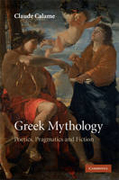
Myths are not simple narrative plots. In ancient Greece, as in other traditional societies, these tales existed only in the poetic or artistic forms in which they were set down. To read them from an anthropological point of view means to study their meaning according to their forms of expression - epic recitation, ritual celebration of the victory of an athlete, tragic performance, erudite Alexandrian poetry, antiquarian prose text; in other words, to study thefunctions of Greek myths in their permanent retelling and reshaping. Falling between social reality and cultural fiction, Greek myths were evolving creations, constantly adapting themselves to new conditions of performance. Using myths such as those of Persephone, Bellerophon, Helen and Teiresias, Claude Calame presents an overview of Greek mythology as a category inseparable from the literature in which so much of it is found. The French edition of this book wasfirst published in 2000. INDICE: Foreword; 1. Narrative and poetic creations; 2. Bellerophon and the pragmatics of epic narrative; 3. Clytemnestra and Orestes at the Pythian games; 4. Io, the Danaids, the outside and tragic inflections; 5. Helen and the purposes of historiography; 6. Tiresias in an Alexandrian hymn; 7. Pausanias and the pantheon of Troezen; 8. Conclusion: virtual realities.
- ISBN: 978-0-521-88858-5
- Editorial: Cambridge University
- Encuadernacion: Cartoné
- Páginas: 275
- Fecha Publicación: 01/05/2009
- Nº Volúmenes: 1
- Idioma: Inglés
